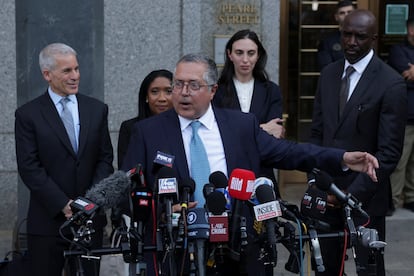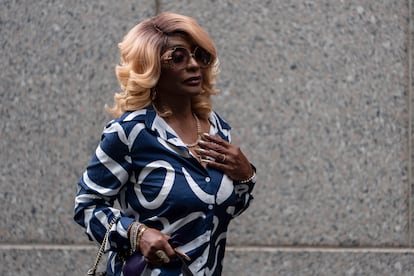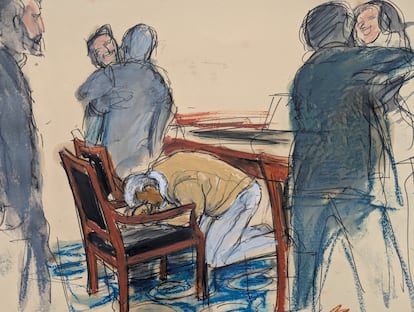Sean Combs trial explained: Verdict, reactions and what’s next
The rapper, known as Diddy or Puff Daddy, has been found guilty of two of the five charges he faced — the lesser offenses — but he still faces several months behind bars


The Sean Combs case isn’t over yet. After a year and a half of allegations, 10 months in jail, and seven weeks on trial, on Wednesday, July 2, the artist — known as Puff Daddy or Diddy — received his verdict: he was found guilty of two counts of transportation to engage in prostitution, but not guilty of two other counts of sex trafficking and a fifth count of racketeering conspiracy, sparing him from a life sentence. Despite this, the judge has decided to keep him in jail, against the requests of his lawyers.
But what do these charges mean? When will the sentencing be announced? How much time will he spend in prison? What’s next for the rapper? Here are a few key questions and answers.
How was the trial? How important were the two main witnesses?
Sean Combs’s trial lasted seven weeks. It began on May 5 with jury selection, and opening statements and testimonies started a week later, on May 12. A total of 34 witnesses took the stand — all for the prosecution. The defense didn’t call any witnesses; it only cross-examined. Not even Combs himself testified.
The two most powerful witnesses were both former partners of the artist known as Diddy. The first was a singer and actress named Cassie, real name Casandra Ventura. Nine months pregnant — she gave birth 10 days after testifying — she recounted the agony she endured during her decade-long relationship with the rapper, describing how he forced her to participate in multi-day orgies with sex workers (referred to as “freak-offs") under threats. He regularly beat, abused, and harassed her. Her detailed account of their turbulent relationship, which lasted from 2007 to 2018, set the tone for the entire trial.
The second witness, an anonymous woman who testified under the name Jane, described a similar pattern of behavior, including beatings, threats to her safety and her family’s, and an overwhelming sense of fear. Her testimony demonstrated that the behavior persisted over time, as she dated Combs between 2021 and 2024.
Who made up the jury? Why did they deliver a partial verdict?
The jury was composed of 45 people selected from among hundreds; only 12 were ultimately chosen. In mid-June, halfway through the trial, Judge Aran Subramanian decided to remove one juror for “lack of candor,” replacing them with one of the six alternates. The final verdict was delivered by eight men and four women, all residents of New York State, ranging in age from 34 to 70.
Deliberations began on Monday, and the jurors reported that one of them — a scientist from Manhattan — was having trouble following the judge’s instructions. On Tuesday afternoon, they returned a verdict, but only a partial one: they had reached decisions on four of the five charges — the two related to sex trafficking and the two for transportation to engage in prostitution.
However, they said they were unable to reach a decision on the most serious charge: racketeering. In a note to the judge, the jury said there were members “with unpersuadable opinions on both sides.”
Judge Aran Subramanian sent them back to continue deliberating. Finally, on Wednesday, shortly after 10 a.m. (New York time), they delivered a complete verdict.
What crimes has Sean Combs been convicted of?

When he was arrested in September, prosecutors charged Combs with sex trafficking, racketeering conspiracy, and transportation to engage in prostitution. In April, the charges were partially expanded: two counts of sex trafficking, two of transportation to engage in prostitution, and one of racketeering.
The jury found Combs guilty of the two counts of transportation to engage in prostitution and not guilty of the sex trafficking or racketeering charges. According to legal experts, the jury likely did not find the evidence strong or conclusive enough to justify convicting him of the most serious and complex charges, which carry the harshest penalties.
What does “transportation to engage in prostitution” mean? How is it different from sex trafficking, and why was Combs convicted of the former?
The charge of sex trafficking by force, fraud, or coercion (its full legal name) differs from the one Combs was convicted of — transportation to engage prostitution or sexual activity. The key difference lies in the element of exploitation: in sex trafficking, the focus is on the use of control and manipulation — specifically, force, fraud, or coercion — to compel a person to engage in sexual acts (this applies only to adults; if minors are involved, the law is different).
Prosecutors attempted to prove this charge using the testimonies of Cassie and Jane, but the jury ultimately did not find the evidence sufficient to support it.

In contrast, the charge for which Combs was found guilty centers on the act of transportation itself — that is, moving a person with the purpose of engaging in prostitution. The nature of the offense is fundamentally different: in sex trafficking, the crime lies in forcing someone to perform sexual acts; in transportation, the key element is the act of moving the person — whether across state lines or international borders — for the purpose of engaging in a certain activity, whether that activity is illegal or not. The offense may or may not involve sex trafficking, and it does not necessarily require force or coercion.
Why wasn’t Combs convicted of racketeering, which carries a potential life sentence?
The most serious charge Combs faced was racketeering conspiracy, which would have required proving that he led a criminal organization — but it was also the most difficult to prove. That charge demands a long list of legal conditions be met. The jury would have needed to conclude that Combs entered into an agreement — verbal or written, explicit or implicit — with at least one other person in the network to commit at least two crimes from a list of 35 federal offenses. These include kidnapping, extortion, arson, fraud, human trafficking, drug possession and distribution, forced labor, and more.
Additionally, those crimes must have occurred within a 10-year window and the illegal activities must have taken place across U.S. state lines or internationally.
This was the charge Combs’s lawyers most aggressively tried to avoid, as it carries a minimum sentence of 20 years in prison — and can go up to life imprisonment.
What sentence does Sean Combs face? When will it be announced?
Having avoided conviction on the severe charge of criminal conspiracy — which can carry a life sentence — as well as the two sex trafficking charges (each punishable by up to 15 years in prison), Sean Combs now faces up to 20 years in prison: 10 years for each of the two counts of transportation to engage in prostitution.

Judge Subramanian announced on Wednesday, just hours after the jury’s verdict, that he intends to deliver the sentence in no less than three months — on October 3. Combs’s lawyers have requested that the sentencing be expedited, and a hearing on that matter is scheduled for Tuesday, July 8.
Will he remain in prison or be released?
For now, the judge has decided that Combs will remain in the Brooklyn jail where he has been held since September, without the possibility of pretrial release under the conditions proposed by his lawyers — namely, surrendering his passport and posting $1 million bail. Subramanian explained that he had denied bail before the trial and saw even less reason to grant it now.
“At trial, the defense conceded the defendant’s violence in his personal relationships, saying it happened with Cassie and Jane,” the judge said. He also emphasized that Combs engaged in violent and illegal conduct after he learned he was under investigation, which showed “a disregard for the rule of law and a propensity of violence”
How did Combs react to the verdict?
The singer appeared joyful upon hearing the jury’s decision. He clasped his hands in a prayer-like gesture, raised his fist, covered his face, and searched the courtroom for his mother and children, who were present. “I love you, Mom, I love you,” he repeated to his mother.
However, when he learned that he would not be granted conditional release, his reaction turned to surprise. “We’re gonna make it through this,” he told his family. “I love you all. Be strong.”

Why do the lawyers consider it “a great victory”?
“This is a great victory for Sean Combs. It’s a greay victory for the jury system,” said Marc Agnifilo, one of Combs’s attorneys, speaking outside the courthouse. He stated that his client “will get his life back,” and emphasized that the New York District Attorney’s Office never loses racketeering cases — making the verdict all the more significant.
What do prosecutors and victims think?
There was a clear sense of disappointment. “He’s an extremely violent man with an extraordinarily dangerous temper who has shown no remorse and no regret for his multiple victims,” stated lead prosecutor Maurene Comey.
Advocacy groups for survivors of sexual violence also expressed disappointment in the outcome. Attorneys representing Casandra Ventura praised their client’s bravery on the stand, stating that she “displayed unquestionable strength and brought attention to the realities of powerful men in our orbit and the misconduct that has persisted for decades without repercussion.”
“By coming forward with her experience, Cassie has left an indelible mark on both the entertainment industry and the fight for justice,” the statement continued. In fact, Ventura personally asked the judge not to release Combs.

Another witness in the trial — and one of Combs’s accusers — is singer Dawn Richard, a member of the group Danity Kane, which the rapper helped form. Her attorneys also described the verdict as a “disappointment.” “But the criminal charges are different than the civil claims we filed and have been fighting against Sean Combs. We will continue to aggressively fight our case until we obtain full and complete justice for Dawn,” they said in a statement.
Renowned feminist attorney Gloria Allred, who represented several of the accusers, said victims and witnesses were concerned for their safety. “But they overcame their fear, they found their courage, and they did speak to law enforcement because they felt it was the right thing to do.”
What comes next?
This is clearly a victory for Sean Combs — but only in the context of two criminal cases brought by prosecutors: those involving Cassie and Jane. Cassie filed a lawsuit — in fact, the suit that ignited the entire case — in November 2023, but withdrew it the following day. The status of Jane’s case remains unknown. As such, this case has been pursued solely by the prosecution.
But many more lawsuits are still ahead, filed through civil channels. There are reportedly around 150 lawsuits from men and women across the United States accusing Combs of drugging, abusing, raping, or violently assaulting them, both in professional and personal settings, involving adults and minors.
This victory is only temporary. There are many chapters still to be written in the legal story of Sean Combs.
Sign up for our weekly newsletter to get more English-language news coverage from EL PAÍS USA Edition
Tu suscripción se está usando en otro dispositivo
¿Quieres añadir otro usuario a tu suscripción?
Si continúas leyendo en este dispositivo, no se podrá leer en el otro.
FlechaTu suscripción se está usando en otro dispositivo y solo puedes acceder a EL PAÍS desde un dispositivo a la vez.
Si quieres compartir tu cuenta, cambia tu suscripción a la modalidad Premium, así podrás añadir otro usuario. Cada uno accederá con su propia cuenta de email, lo que os permitirá personalizar vuestra experiencia en EL PAÍS.
¿Tienes una suscripción de empresa? Accede aquí para contratar más cuentas.
En el caso de no saber quién está usando tu cuenta, te recomendamos cambiar tu contraseña aquí.
Si decides continuar compartiendo tu cuenta, este mensaje se mostrará en tu dispositivo y en el de la otra persona que está usando tu cuenta de forma indefinida, afectando a tu experiencia de lectura. Puedes consultar aquí los términos y condiciones de la suscripción digital.








































